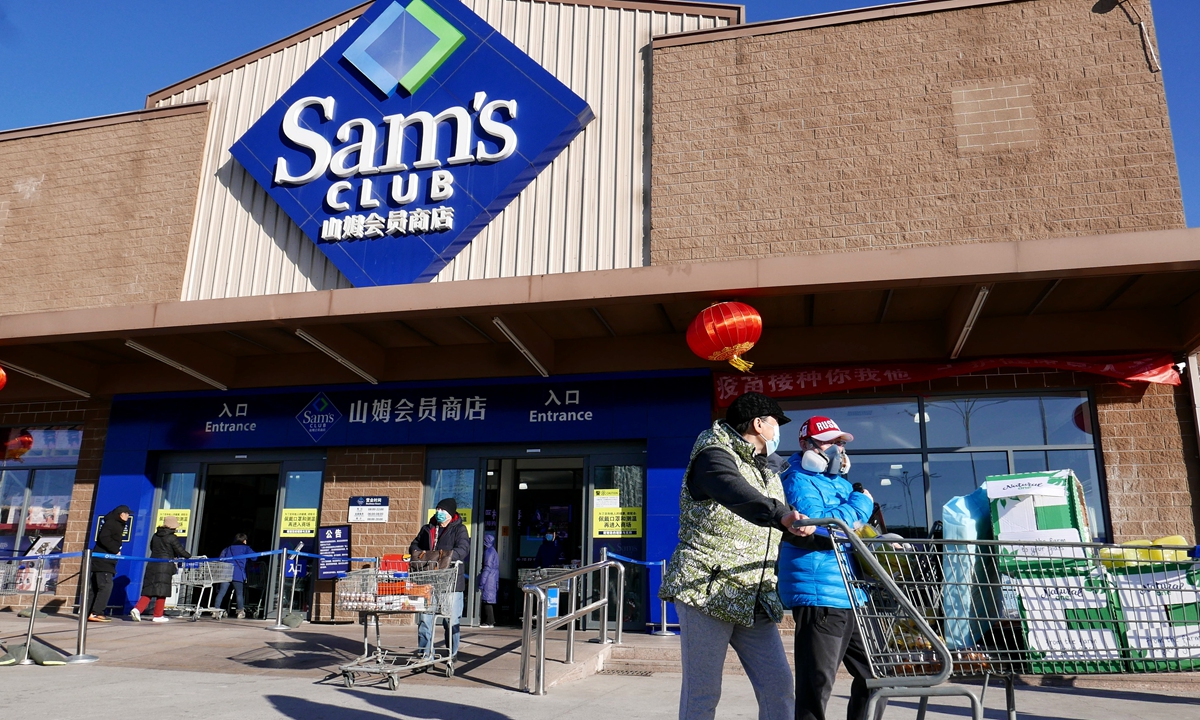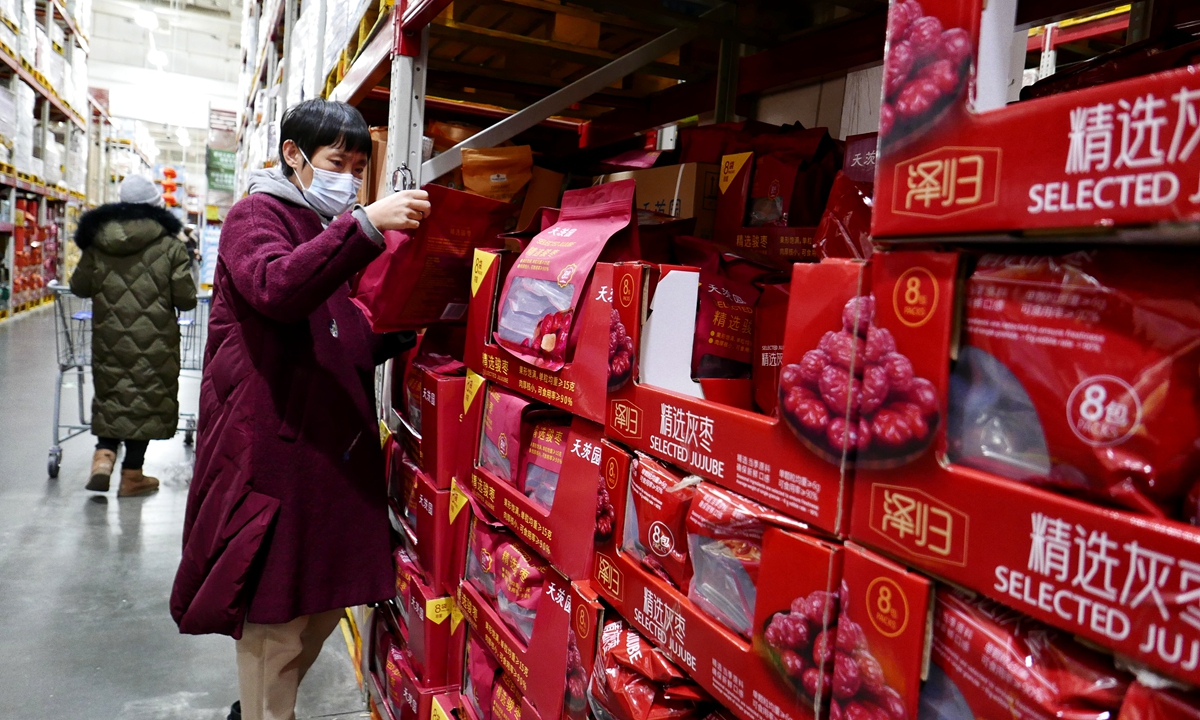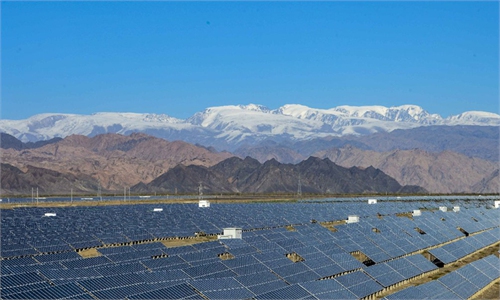
Sam's Club store in Yizhuang area of Beijing Photo: Li Hao/GT
Angry Chinese customers have vowed to suspend their membership cards after they found that US retailer giant Walmart has removed Xinjiang-produced commodities from its Sam's Club, the high-end membership stores of Walmart.
Their anger comes after US chip giant Intel apologized for a high-profile statement to boycott products from Northwest China's Xinjiang Uygur Autonomous Region and US President Joe Biden on Thursday signed a bill banning goods from Xinjiang, citing so-called forced labor.
"Why have you taken Xinjiang products off the shelves?" Netizens asked under the official Sina Weibo account of Sam's Club, after they found that Xinjiang products, mostly fruits, became unavailable online.
The Global Times searched for products related to Xinjiang in Sam's app and found although there were entries displayed, the search results were empty. Some typical Xinjiang products such as dates, cantaloupes and apricots are still available, but they are not produced in Xinjiang.
For example, the first result of dates is made in Shenzhen, South China's Guangdong Province, and black raisins in Langfang, North China's Hebei Province.
A similar phenomenon could be seen at Walmart supermarket's online store.
The move triggered backlash from netizens, and some said that they will terminate their membership cards for Sam's Club. Some commented that, "if you have business in China, then you should follow China's rules, or get out of China."
The hashtag "#Sam's Club, Xinjiang" has been high on the most searched terms list on Friday, with the number of searches hitting more than 1.7 million times.
Global Times reporters found cantaloupes at a Sam's Club in Beijing but they are originated from South China's Hainan Province, and there are no Xinjiang dates. A shop assistant said that Xinjiang jujube have been "out of stock" recently.

A customer selects jujube at a Sam's Club store in Beijing on December 24, 2021. Photo: Li Hao/GT
When asked why users cannot find Xinjiang products, an online customer service agent of Sam's Club told the Global Times that, "the delisting of goods is arranged according to our inventory, and we have many other similar products for choosing." When asked if it is out of stock, the answer was, "here is what can't be found."
The Global Times found there were still some cantaloupes from Xinjiang in a Walmart supermarket in Beijing's Haidian district, no Xinjiang dates or raisins were sold.
Walmart's Xinjiang raisins have not been on the shelves since May, nor have they been restocked, according to a salesperson in the Haidian store, and they did not know why, nor did they know exactly when the goods would be replenished. The employee said that, "this is the responsibility of Walmart's procurement sector."
Sources told the Global Times that Sam's Club has stopped selling Xinjiang products in the last two days.
A spokesperson from supermarket chain Carrefour told the Global Times on Friday that "It only takes three or four days from ordering Xinjiang goods to putting them on the shelves of supermarkets in Beijing and Shanghai."
Carrefour sells a wide range of Xinjiang products, including bergamot pears, walnuts, jujubes, apples, and textile products made from Xinjiang cotton. The spokesperson said the company has set up a direct sourcing base in Xinjiang to bring convenience for such purchases.
Products from Xinjiang such as prunes, apples, cantaloupes and bergamot pears are very popular, and they account for "a considerable amount" of the supermarket chain's business of fresh fruits.
The spokesperson said that Xinjiang paper-skinned walnuts accounted for 52 percent of Carrefour walnut sales, Xinjiang dates accounted for 93.5 percent of its total sales, and all its raisins are produced in Xinjiang.
"The portion is almost the same for the retailing industry," the person said.
Although Walmart China's expansion slows after a pandemic-led boom, Sam's Club's business in China has grown rapidly — the number of new members in the second quarter of 2021 more than doubled the same period last year, according to Walmart's financial reports. The brand anticipated there will be 40-45 stores nationwide either operational or under construction by the end of 2022.
Analysts said thousands of US companies are now kidnapped by Washington's political aim and ideological confrontation with China, and have to face a dilemma: show a political gesture by complying with the bill, or risk angering and losing 1.4-billion Chinese consumers.
"US firms are all aware that this is a complete political agenda and has nothing to do with economic issues," Wang Jun, chief economist with Zhongyuan Bank, told the Global Times.
But analysts cautioned that US firms need to think twice before making a clear public stance, given how Intel's "Xinjiang stance" enraged Chinese people and led to widespread calls of boycott against the US firm.
Walmart entered China in 1996 and opened its first store in Shenzhen. So far, it has opened more than 400 supermarkets and more than 20 distribution centers in over 100 cities across the country.



